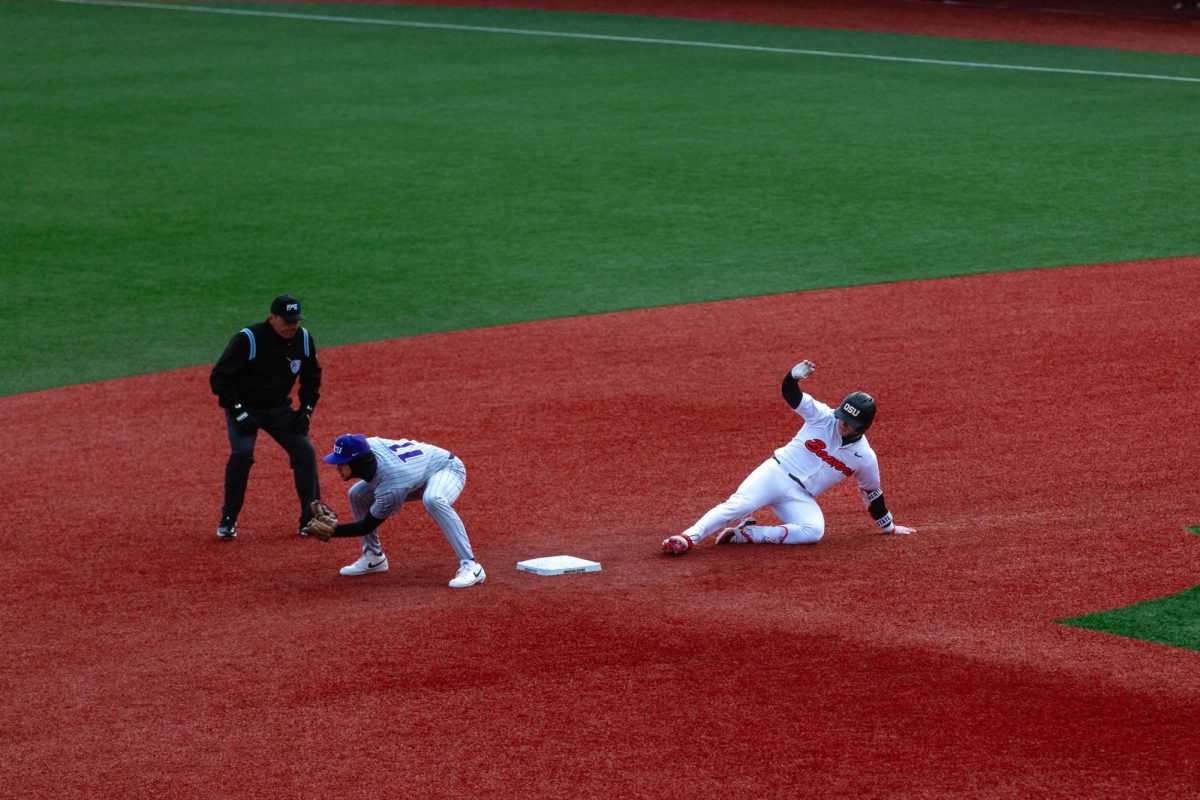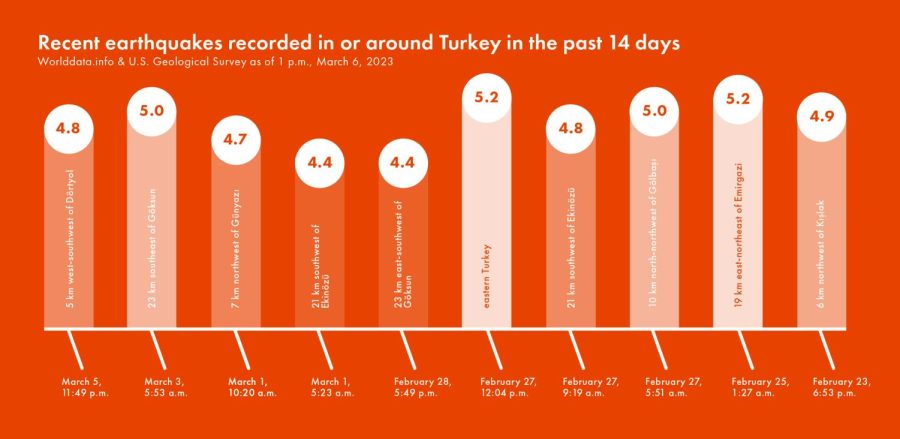OSU’s Turkish students band together in wake of tragic earthquakes
A timeline of recent earthquakes and magnitudes around Turkey.
March 6, 2023
Members of Oregon State University’s Turkish Culture Association are among the tens of millions of people impacted by the devastating earthquakes in Turkey and Syria on Feb. 6 and Feb. 20, and Feb. 27.
Mustafa Bozkus, president of the TCA and horticulture master’s student at OSU, said their small community of just over 20 members has been deeply affected and they’re all worried for Turkish citizens.
“We are very sad for our nation, our people, and the Syrian people; they also need help,” Bozkus said.
Bozkus said he feels OSU and the media have helped and made it possible for their voices to be heard, and everything that can be done is being done.
“All our citizens have struggled by showing the necessary sensitivity and doing (as much as) everyone can do,” Bozkus said.
According to Bozkus, TCA members are doing their best to support each other and are working on outreach, creating more campaigns to bring awareness to more people.
Members of the TCA are from all over Turkey, though a few are from the regions most damaged by the quakes, such as electrical engineering PhD student Omer Firat, who is from Malatya, a city of around a million people.
According to Firat, the majority of the Malatya population has evacuated, leaving only 300,000 of the original million and many have fled to the safety of western Turkey. Firat said that, while his own family managed to get out unscathed, one friend lost about 40 cousins and another in Marash lost his unborn twins and his mother to the quakes.
Firat said over 30,000 buildings have sustained serious damage and many will have to be demolished and rebuilt before residents can move back to the cities. He said his own family had to stay in their car before moving on to his grandfather’s farm on the other side of the country.
“(My family) said every other ten minutes there is another earthquake happening,” Firat said. “So many people have been affected mentally as well, especially the young kids.”
Firat said multiple families are living together in houses on the west to get away from the danger of the cities, but aftershocks have been felt that far away too. He said the area affected can be compared to the distance between Philadelphia and Boston, with around 12 million people living in those cities.
“(The earthquakes) also affected Syria,” Firat said. “I think (that) situation is even worse than in Turkey because they’ve been in a civil war situation for over ten years.”
According to Firat, the Turkish government assumed the quakes were slowing down before the third major quake on Feb. 20. They’re estimating it will take at least a year to recover from the damage caused by the quakes.
“I’m not sure it’s going to be possible to do everything in a year,” Firat said. “We’re talking about ten cities, 15 million people. These are big cities. It’s not going to be easy.”
Firat explained that the Turkish government has set up a program connecting the affected cities to other cities in the west of the country so refugees can quickly and easily find a place to stay. He said the government is also paying for travel and lodging expenses for the displaced people, and Turkish people are very willing to help each other.
“I was talking with my uncle and the first night (he saw) a car with a plate number from all the way in the far west of Turkey, which is over ten hours away,” Firat said. “(The driver) literally filled up his car with food and other necessary things that he was just distributing to the people.”
Firat said they’re hoping to get exposure in the Memorial Union and the Valley Library as well as getting in touch with other media outlets, as Bozkus has only been able to connect with one local channel in Eugene. He said the TCA also hopes to see OSU’s President Murthy send out an email in support of Turkey.
“No matter who they are, any human being who has humanity in them will not be able to remain unresponsive to this situation without grieving and suffering even a bit of their heart for the people who died,” Bozkus said. “Because everyone we meet and knows the subject feels this pain with us.”
Grace Atebe, executive director of student affairs at the Office of International Services, said the OIS reached out to check on the 29 Turkish students currently attending OSU to offer resources. She said there are not any Syrian students currently attending OSU.
“This unfortunate incident impacts many OSU community members,” Atebe said. “Some students, faculty and staff call Turkey home. Others have connections to Turkey through friends, family or work relationships.”
Atebe said Turkish students can find community and support in the TCA as well as via university resources like Counseling and Psychological Services, the Basic Needs Center and academic support services.
“In collaboration with clubs and organizations (like) ASOSU and Orange Media Services, the Turkish Culture Association at OSU has continued to create awareness of the impacts of the earthquake within the Corvallis student body and the Corvallis area community to mobilize support for ongoing relief efforts in Turkey,” Atebe said.
According to Atebe, there are resources for support ranging from community and engagement, health and wellbeing, academic success as well as ways for OSU students and faculty to lend a hand, too.
“We encourage everyone to find creative ways to get involved in the ongoing disaster relief efforts,” Atebe said. “This may be through raising awareness to this tragedy, mobilizing others and lending the much-needed support through legitimate humanitarian organizations.”


















































































![Newspaper clipping from February 25, 1970 in the Daily Barometer showing an article written by Bob Allen, past Barometer Editor. This article was written to spotlight both the student body’s lack of participation with student government at the time in conjunction with their class representatives response. [It’s important to note ASOSU was not structured identically to today’s standards, likely having a president on behalf of each class work together as one entity as opposed to one president representing all classes.]](https://dailybaro.orangemedianetwork.com/wp-content/uploads/2025/03/Screenshot-2025-03-12-1.00.42-PM-e1741811160853.png)
























